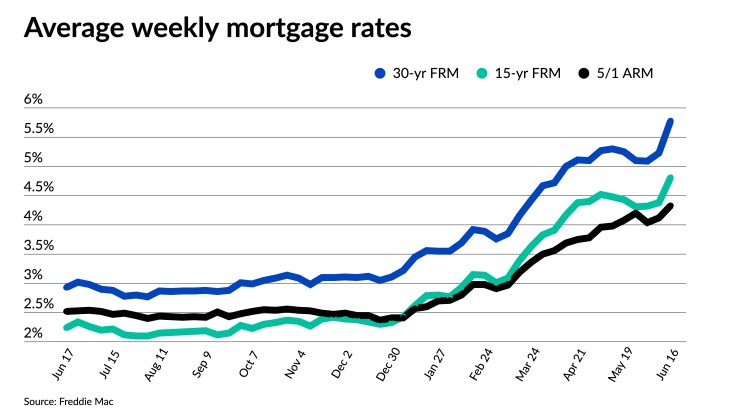On the heels of the latest

The 30-year fixed rate surged 55 basis points to an average of 5.78% for the weekly period ending June 16, up from 5.23%
“These higher rates are the result of a shift in expectations about inflation and the course of monetary policy,” said Freddie Mac Chief Economist Sam Khater in a press release.
A series of economic reports over the past week, including higher-than-expected inflation numbers and rising pessimism among consumers, helped push rates higher.
The May
“Following the CPI report, The University of Michigan consumer sentiment index reached a record low, as consumers are less confident in economic conditions even with very low unemployment,” Thomas said in a research blog post.
“Markets are beginning to show more concern that the Fed must take more aggressive actions to tame inflation, which would increase the likelihood of a recession as the economy slows down,” he added.
Although the news of the past week may have been the spark behind the eye-popping spike in interest rates, elevated levels are not necessarily bad for mortgage companies if they provide a level of predictability for consumers, according to attorney Marty Green, principal at mortgage law firm, Polunsky Beitel Green.
The
“Based on our conversations with clients, we believe many market participants will be pleased with the aggressive approach of the Federal Reserve, as there is some belief the Fed’s decision will more quickly bring stability to the home mortgage interest rate environment,” he added.
Khater expressed a similar sentiment, saying “higher mortgage rates will lead to moderation from the blistering pace of housing activity,” with the result being “a more balanced housing market.”
Along with the large jump in the 30-year average, the 15-year fixed-rate mortgage also saw a sizable increase, rising to 4.81% from 4.38% the previous week. A year ago, the 15-year average came in at 2.24%.
The 5-year Treasury-indexed hybrid adjustable rate headed upward as well to an average of 4.33%, up 21 basis points from 4.12% seven days earlier. In the same week last year, the 5-year ARM stood at 2.52%.




